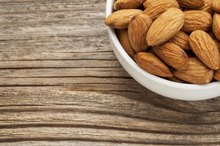What does fact checked mean?
At Healthfully, we strive to deliver objective content that is accurate and up-to-date. Our team periodically reviews articles in order to ensure content quality. The sources cited below consist of evidence from peer-reviewed journals, prominent medical organizations, academic associations, and government data.
- Linus Pauling Institute: Folic Acid; Jane Higdon, Ph.D.; September 2007.
- Office of Dietary Supplements: Dietary Supplement Fact Sheet: Folate.
The information contained on this site is for informational purposes only, and should not be used as a substitute for the advice of a professional health care provider. Please check with the appropriate physician regarding health questions and concerns. Although we strive to deliver accurate and up-to-date information, no guarantee to that effect is made.
Do Nuts Have Folic Acid?
Various nuts provide natural sources of folate, a form of folic acid found in plant foods. Folate is a vitamin necessary for proper growth and development that is required by everyone, especially pregnant women. Consuming nuts and other folate-rich foods daily can ensure adequate intake of the vitamin. Consult a registered dietitian for a full list of folate-rich and other nutritious foods.
Nuts and Folate
Nuts are packed with folate and other vital nutrients. Some folate-rich nuts include almonds, hazel nuts, walnuts and peanuts. One-half cup or 67 g of hazel nuts provides 76 mcg of folate or 20 percent of the recommended Daily Value, or DV. A food source that provides more than 20 percent of the DV is considered a high source of folic acid. A half cup or 71 g of almonds provides 36 mcg of folate. The same serving size of chopped walnuts provides 57 mcg of folate. In addition to folate, various nuts are rich sources of fiber, protein and healthier fats like poly and monounsaturated fatty acids. Nuts also provide good sources of an array of other essential vitamins and minerals.
- Nuts are packed with folate and other vital nutrients.
- One-half cup or 67 g of hazel nuts provides 76 mcg of folate or 20 percent of the recommended Daily Value, or DV.
Folate Function
Almonds and Selenium
Learn More
Folate is a B-vitamin required by the body for the growth and development of cells. It is necessary for the production of red blood cells and preventing anemia. It is especially important for women before and during pregnancy. A lack of regular folate intake can lead to a deficiency. In pregnant women, this can result in premature infants, low birth weight or neural tube defects.
- Folate is a B-vitamin required by the body for the growth and development of cells.
- A lack of regular folate intake can lead to a deficiency.
Daily Recommendation
Adults require 400 mcg of folate daily. Pregnant or lactating women require greater amounts, approximately 500 to 600 mcg of folate. In addition to a folate-rich diet, the Linus Pauling Institute recommends taking a multivitamin formula that provides 100 percent of the DV for folate 1. Folate is added to a variety of foods as folic acid. Some examples include fortified breakfast cereals, breads, pastas and juices. Other natural sources of folate include green leafy vegetables, citrus fruits and legumes.
- Adults require 400 mcg of folate daily.
- In addition to a folate-rich diet, the Linus Pauling Institute recommends taking a multivitamin formula that provides 100 percent of the DV for folate 1.
Diet Considerations
Can You Eat Mixed Nuts While Pregnant?
Learn More
Nuts can be consumed daily, but should be limited because of their high calorie content. Consume a handful or 1 oz. of various nuts throughout the day. Try adding walnuts or almonds to your oatmeal or other high-fiber cereal. Peanuts, walnuts, hazelnuts, cashews and almonds can all be added to yogurt or mixed in your favorite salad. Make your own portable trail mix by combining a variety of nuts and dried fruits. Always store nuts in a refrigerator or freezer to ensure freshness and prevent spoilage.
- Nuts can be consumed daily, but should be limited because of their high calorie content.
- Always store nuts in a refrigerator or freezer to ensure freshness and prevent spoilage.
Related Articles
References
- Linus Pauling Institute: Folic Acid; Jane Higdon, Ph.D.; September 2007.
- Office of Dietary Supplements: Dietary Supplement Fact Sheet: Folate.
- Feng Y, Wang S, Chen R, Tong X, Wu Z, Mo X. Maternal folic acid supplementation and the risk of congenital heart defects in offspring: a meta-analysis of epidemiological observational studies. Sci Rep. 2015;5:8506. doi:10.1038/srep08506
- Khan KM, Jialal I. Folic acid (folate) deficiency. In: StatPearls. Updated December 3, 2019.
- Obeid R, Herrmann W. The emerging role of unmetabolized folic acid in human diseases: myth or reality?. Curr Drug Metab. 2012;13(8):1184-95. doi:10.2174/138920012802850137
- Xun P, Liu K, Loria CM, et al. Folate intake and incidence of hypertension among American young adults: a 20-y follow-up study. The American Journal of Clinical Nutrition. 2012;95(5):1023-1030. doi:10.3945/ajcn.111.027250
- Williams J, Mai CT, Mulinare J, et al. Updated estimates of neural tube defects prevented by mandatory folic Acid fortification - United States, 1995-2011. MMWR Morb Mortal Wkly Rep. 2015;64(1):1–5.
- Huang P, Wang F, Sah BK, et al. Homocysteine and the risk of age-related macular degeneration: a systematic review and meta-analysis. Sci Rep. 2015;5:10585. doi:10.1038/srep10585
- Christen WG, Glynn RJ, Chew EY, Albert CM, Manson JE. Folic acid, pyridoxine, and cyanocobalamin combination treatment and age-related macular degeneration in women: the Women's Antioxidant and Folic Acid Cardiovascular Study. Arch Intern Med. 2009;169(4):335-41. doi:10.1001/archinternmed.2008.574
- Pieroth R, Paver S, Day S, Lammersfeld C. Folate and its impact on cancer risk. Curr Nutr Rep. 2018;7(3):70–84. doi:10.1007/s13668-018-0237-y
- Atta, C.; Fiest, K.; Frolkis, A. et al. Global Birth Prevalence of Spina Bifida by Folic Acid Fortification Status: A Systematic Review and Meta-Analysis. Am J Public Health. 2016 Jan;106(1):e24-34. DOI: 10.2105/AJPH.2015.302902.
- Chen, P.; Li, C.; Li, X. et al. Higher dietary folate intake reduces the breast cancer risk: a systematic review and meta-analysis. Br J Cancer. 2014 Apr 29;110(9):2327-38. DOI: 10.1038/bjc.2014.155.
- Cui, R.; Iso, H.; Date, C. et al. Dietary folate and vitamin b6 and B12 intake in relation to mortality from cardiovascular diseases: Japan collaborative cohort study. Stroke. 2010 Jun;41(6):1285-9. DOI: 10.1161/STROKEAHA.110.578906.
- Gopinath, B.; Flood, V.; Rochtchina, E. et al. Homocysteine, folate, vitamin B-12, and 10-y incidence of age-related macular degeneration. Am J Clin Nutr. 2013 Jul;98(1):129-35. DOI: 10.3945/ajcn.112.057091.
Writer Bio
Anthony Isaac Palacios has been a professional writer for more than five years for various media including magazine, newspaper and the Internet. He has a Master of Science in dietetics and nutrition and specializes in health and nutrition articles for the general public. Palacios enjoys cooking with wine, and sometimes even adding it to the food.









